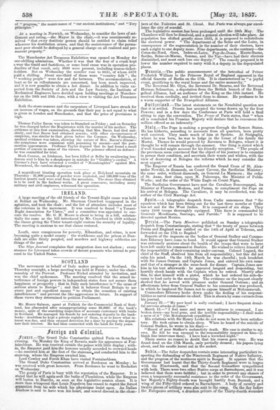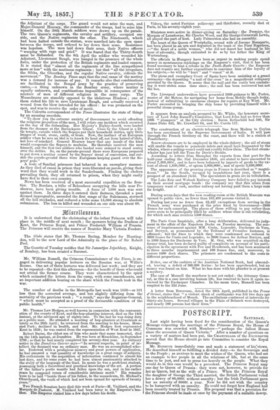Intrigu aut
,fraurr.—The Grand Duke Constantine quitted Paris on Saturday evening. On Monday the King of Bavaria made his appearance at Fontainebleau. Ho was received outside the palace with little display ; within, the Emperor paid him the honours usually accorded to crowned heads —he received him at the foot of the staircaseuand conducted him to the stair-top, where the Empress awaited him.
Lord Cowley and Perak Khan have visited Fontainebleau. The Grand Duke Constantine arrived at Bordeaux on Monday ; he was received with great honours. From Bordeaux he went to Rochefort on Wednesday.
The gossip of Paris is busy with the reputation of the Emperor. It is stated that he will again seek the baths of Plorabienas, while the Empress will hasten to Manta as soon as the legislative session doses. It is more than whispered that Louis Napoleon has ceased to regret the forced separation from his wife which his physicians insist upon. An Italian Duchess is said to have won his heart, and sowed discord in the chain
hers of the Tuileries and St. Cloud. But Paris was always par excellence the city of scandal. The legislative session has been prolonged until the 28th May. The Chambers will then be dissolved, and a general election will take place. As population has shifted greatly since 1852, it is proposed to redistribute the electoral power. The department of the Seine and the Loire, in consequence of the augmentation in the number of their electors, have each a right to one deputy more. Nine departments, on the contrary—the Cotes-du-Nord, Gem, Indre-et-Loire, Puy-de-Dome Haute-Sa.one, Sarthe, Seine-et-Marne, Somme, and the Tar—have had their electors diminished, and must each lose one deputy." The remedy proposed is to lower the number required to carry with it a deputy in the depopulated places.
r us s ia.—The public announcement of the betrothal of Prince Frederick William to the Princess Royal of England appeared in the official Gazette of Berlin on the 17th. It is characterized as "a joyful event, gratifying to the royal house and the entire monarchy."
The Reverend Mr. Glyn, the Reverend Dr. Stearne, and the Reverend Herman Schmettan, a deputation from the British branch of the Evangelical Alliance, had an audience of the King on the 15th instant. He received them cordially, and invited them to dinner. He professes to be a warm supporter of the Evangelical Alliance.
mitirrlittir.—The latest statements on the Neuchatel question are that it is settled. Prussia has accepted the terms drawn up by the four Powers ; and in a few days the Conference at Paris will hold a final sitting to sign the convention. The Prase of Pans states, that "when all is concluded his Prussian Majesty will declare that he renounces the million offered as an indemnity."
Stalq.—The Pope is making a progress through the Roman States. He has hitherto, according to accounts from all quarters, been pretty well received. They made much of him at Spoleto. At Sinigaglia, where he was born, he was to lodge in the house of his family the Mastai. Thence he would proceed by Ravenna to Bologna, where it in thought he will remain through the summer. One thing is stated which if well founded might account for his friendly reception. "The people of the provinces seem convinced that the object of his journey is to examine in person their condition, and ascertain their wants and wishes, with the view of decreeing at Bologna the reforms which he may consider the most urgent." The Emperor of Russia has conferred the Grand Cross of St. Alexander Newski, in diamonds, on Count Cavour, the Sardinian Minister; the same order, without diamonds, on General -La Marmora •' the order of St. Anne, first class, upon M. Paleocapa, the Minister of Public Works ; and the order of the White Eagle on Count Nigra.
The Sardinian Government have sent the Cavalier° Boncompagni, its Minister at Florence, Modena, and Parma, to compliment the Pope on his arrival at Bologna. The Cavalier°, it may be recollected, was the author of the Civil Marriage Act.
$pain.—A telegraphic despatch from Cadiz announces that "the squadron which has been fitting out for the last three months at Cadiz has set sail for the West Indies. It is composed of six ships. They carry 2450 troops thoroughly equipped. This force is commanded by Generals Mendimata, Santiago, and Parrido." It is supposed to be directed against Mexico.
puist.—The Paris Ifoniteur published on Sunday a telegraphic despatch from Constantinople stating that " the treaty of peace between Persia and England was ratified on the 14th of April at Teheran, and forwarded on the 17th to Bagdad."
Reports of the inquests on the bodies of General Stalker and Commodore Ethersey have come to hand. It would appear that General Stalker was extremely anxious about the health of the troops that were to have been left under his command at Bushire. He wished to relieve himself of the responsibility of their remaining under canvass. Colonel Lugard, the chief of the Staff, absolved him from all responsibility ; but this did not calm his mind. On the 14th March he was cheerful ; took breakfast with Sir James Outram and Captain Jones, and entered his own name and that of a stranger in the mess-book for dinner. Captain Jones saw him in his tent afterwards : he appeared languid and desponding, but heartily shook hands with the Captain when he retired. Shortly after this, he shot himself with a pistol, which he had ordered his aide-decamp to load early in the morning. The evidence on the inquest clearly showed that .he served with pleasure under General Outrara ; and an affectionate letter from General Stalker to his commander was produced, in which he implored Sir James not to expose himself at Mohammerah. Commodore Ethersey broke down under the feeling of his responsibilities as naval commeeder-iu-chief. This is shown by some extracts from his journal.
January 22.—" My poor head is sadly confused; I have frequent dreadful nervous attacks at times."
March 12.—" I feel more and more my unfitness to command. I am broken down—say head gone, and the terrible responsibility—I shall make a mesa of it" [the Mohammerah expedition.]
His relations with Sir Henry Leeke do not seem to have been satisfactory. He took opium to obtain sleep. When he heard of the suicide of General Stalker, he wrote in his diary " Heard of poor Stalker's melancholy death. His case is similar to my own. He felt he was unequal to the responsibility imposed on him—(a blank line intervenes then). I have had a wretched night.' There seems no reason to doubt that his reason gave way. He was found dead on the 17th March, only partially dressed ; his papers lying about, and his candle burnt out in the socket.
S OHL—The fuller despatches contain some interesting particulars respecting the disbanding of the Nineteenth Regiment of ative Infantry, and the progress of the mutinous spirit in Bengal. It appears that the Government had learnt that the Thirty-fourth Regiment were in league with the Nineteenth, and that the Second Grenadiers sympathized with both. There were two other Native corps at Barrackpore, and it was believed that these were faithful; but in order to prevent any chance of even a temporarily successful resistance to the order of the Government, her Majesty's Eighty-fourth was brought hastily from Burmah, and a wing of the Fifty-third ordered to Barrackpore. A body of cavalry and twelve pieces of artillery were also sent to the camp. On the day before the Europeans arrived, a drunken private of the Thirty-fourth wounded the Adjutant of the corps. The guard would not seize the man, and Major-General Hearsey, the commander of the troops, had to seize him himself. On the 30th March soldiers were drawn up on the parade. The two Queen's regiments, the cavalry and artillery, occupied one side, and the Native regiments the other. The Nineteenth, which had been halted outside the station, were marched into the open space between the troops, and ordered to lay down their arms. Resistance was hopeless. The men laid down their arms, their Native officers "weeping with rage and grief." It was feared that the Thirty-fourth must be disbanded. On the 8th April the soldier who wounded his Adjutant, Lieutenant Baugh, was hanged in the presence of the whole force, under the protection of the British regiments and loaded cannon. It is stated that almost all the regiments of the line sympathized more or less" with the mutinous regiments ; but that "511 the irregulars, the Sikhs, the Ghoorkas, and the regular Native cavalry, ridicule the movement." The Bombay Times says that the real cause of the mutiny was a demand for increase of pay. It remarks also that combinations are facilitated in the Bengal army by the practice of preserving castes,—a thing unknown in the Bombay army, where mutiny is equally unknown, and combinations impossible in consequence of the mixture of men of different religions in the same corps. The Mussulmans are stanchly opposed to the idolatrous Hindoos ; one of them risked his life to save Lieutenant Baugh, and actually received a wound from the blow intended for his officer : he was promoted on the spot, and was to receive the order of merit.
The Calcutta correspondent of the Times illustrates the state of things by an amusing anecdote.
"To show you the extreme anxiety of Government to avoid offending the religious prejudices of the men, I will relate one incident which occurred on the day of the disbanding. Her Majesty's Eighty-fourth were landed from the steamer at the Barrackpore Ghaut. Close by the Ghaut is alittie temple, outside which the Sepoys put their household deities, ugly little images of wood, stone, earth, or brass. Now, the instinct of an European soldier when he sees an idol is to knock its head off, not from hatred of idols, but love of mischief. General Hearsey knew that any insult of the kind would exasperate the Sepoys to madness. He therefore received the men himself, and the first two soldiers who landed were ordered to stand sentry over the deities. So, on the parade-ground there were Europeans prepared to put down a mutiny caused by the Sepoys' dread of conversion, and outside the parade-ground there were Europeans keeping guard over the Sepays' gods."
A body of Santhal prisoners had behaved in an exemplary manner. As they died of ennui in prison they were liberated on parole, giving their word that they would work in the Sonderbunds. Finding the cholera prevailing there, they all returned to prison, when they might easily have fled to their own country. News has been received of a most successful expedition on the frontier. The Bozdars, a tribe of Beloochees occupying the hills near Peshawur, have been giving trouble. A force of 1500 men was sent against them. In three days it entered their fastness, threaded a pass deemed impregnable, ascended the first range of the Suleimans, stormed all the hill stockades, and reduced a tribe some 15,000 strong to absolute submission. The loss in killed and wounded on our side was about 60.



























 Previous page
Previous page